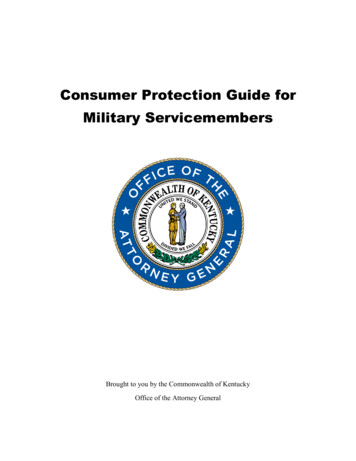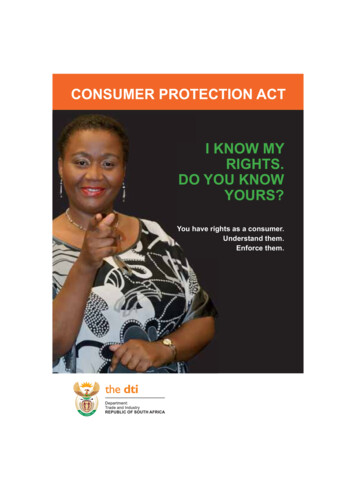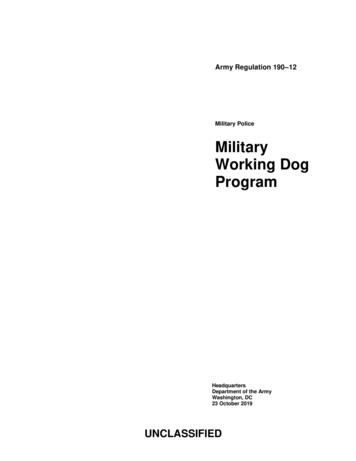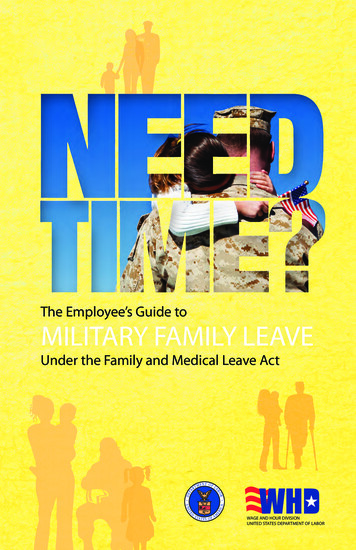
Transcription
Consumer Protection Guide forMilitary ServicemembersBrought to you by the Commonwealth of KentuckyOffice of the Attorney General
DisclaimerThe information contained within this guide is intended to be used for educationalpurposes and is not provided as a substitute for legal advice of any kind. To the best of ourknowledge, the law contained in this guide is current through August 2014.PublicationThis guide is offered free of charge by the Kentucky Attorney General’s Office tomilitary personnel and staff in digital format upon request. For more information, please contactthe office in writing or by phone at:Office of Kentucky Attorney General1024 Capital Center DriveFrankfort, Kentucky 40601Phone: (502) 696-53892
Table of ContentsIntroduction4Chapter 1: Automobile Issues5Chapter 2: Kentucky Consumer Protection Act11Chapter 3: Military Lending Act16Chapter 4: Servicemembers Civil Relief Act19Chapter 5: Payday Lending and Rent-to-Own30Chapter 6: Identity Theft36Chapter 7: Nonprofit and For-Profit Schools41Chapter 8: Housing Issues52Chapter 9: Debt Collection61Chapter 10: Telephone Solicitation and Consumer Telemarketing Protection65Chapter 11: Resources for Servicemembers713
Introduction 1Servicemembers represent a unique target for scammers. They receive paychecks on aregular basis and are targeted by those who want to make a quick buck at the servicemember’sexpense. Servicemembers also face challenges in their ability to research consumer transactionsdue to the high demands of military service. The stress of service and strain on the family maymake consumer protection issues less of a priority in the servicemembers’ minds. Additionally,young military members may not have the expertise and experience necessary to guard againstscammers and predatory business practices. Often, in military families, the military spouse willbe in one location while his or her family is in another. This separation occurs not only when thesolider is deployed but also when the solider is scheduled to be moved to a different base in theUnited States. Protecting servicemembers and their families is crucial to a fair marketplace andimportant to force readiness. The last thing a deployed soldier needs to be worried about is aproblem back home.Used, with permission, from the Tennessee Office of the Attorney General’s “Military Consumer ProtectionGuide.”14
Chapter 1Automobile Issues5
Automobile IssuesAlmost every servicemember will purchase a new or used automobile during his or hertime of service. 2 Vehicle purchases cause more problems for servicemembers than almost anyother financial transaction. 3 Servicemembers should be cautious when making a decision topurchase a vehicle. Some car dealerships engage in “Yo-Yo” scams, loan packing, and “buyhere, pay here” schemes. Servicemembers also receive protections under the Kentucky LemonLaws.The following sections deal with the rights afforded to servicemembers with relation toautomobile purchases and common scams to watch out for as you begin looking for a newvehicle.Yo-Yo Scam 4A “Yo-Yo sale” is a form of bait and switch scam that takes advantage of the acceptedpractice of spot delivery in automobile sales. A spot delivery sale is an automobile sale whereinthe purchaser signs a tentative financing agreement and takes the vehicle off the lot pendingcredit approval for the agreed-upon terms. 5 In a “Yo-Yo sale,” an unscrupulous dealer will theninform the buyer a few days later that the buyer’s credit has not been approved and he or she willhave to make a concession in the form of a higher interest rate, higher monthly payment, higherdown payment, or some combination thereof. If a buyer traded in their original vehicle as part ofthe sale, the dealer will often claim that the trade-in has already been sold and the buyer will not2 National Association of Consumer Advocates, Auto-Dealers’ Predatory Practices Target Our Troops,available at http://www.nclc.org/images/pdf/special gtroops.pdf3 Id.4 Information taken from NAGTRI: Military Veterans and Servicemembers Legal Issues Training Manual5 Spot Delivery Pitfalls, GOVERNOR’S OFFICE OF CONSUMER PROTECTION, livery-pitfalls (last visited May 5, 2014).6
be able to recover the value of the trade-in if he or she wants to keep the original terms of thedeal. 6In order to avoid being the victim of a Yo-Yo sale, a buyer should not pay a downpayment, hand over the keys to a car, sign a purchase agreement, or drive the new car off the lotuntil financing is finalized. 7 Alternatively, if the buyer urgently needs the vehicle, he or sheshould insist in advance on a written assurance that, if the financing should fall through, thedeposit and trade-in will be returned; or, if credit terms change, he or she be allowed to cancelthe deal. 8Loan PackingServicemembers should take the time and effort to read all sales paperwork and confirmthat no additional products or services are being paid for over what was initially discussed withthe dealership. Oftentimes, car dealerships will, unbeknownst to the car purchaser, includeadditional products and services that have not been discussed or requested. This practice iscalled “loan packing.” Add-ons to watch out for include extended warranties, limited warranties,tire protection, gap insurance, Vehicle Identification Number (VIN) etching, fabric protection,and paint protection. Non add-on items that are typical to every car purchase include tax, title,license, and registration fees. While contracting for the purchase of the car, remember that it isperfectly reasonable to request that the dealer slow down, answer your questions, and explaineach add-on that you may have a question about.National Consumer Law Center, In Harm’s Way, available athttp://www.nclc.org/images/pdf/special .7 MICHAEL S. ARCHER, RIPPED OFF: A SERVICEMEMBER’S GUIDE TO COMMON SCAMS, FRAUDS, AND BAD DEALS 195 (2014).8 Spot Delivery Pitfalls, supra note 83.67
Buy Here, Pay Here Dealerships 9“Buy Here, Pay Here” used car dealerships target those with poor credit for automobilesales with high monthly payments designed to make the buyer default, allowing the dealer torepossess and resell the vehicle. Dealers sell old used cars for a large down payment, often equalto the objective value of the car, plus monthly or bi-weekly payments for the remainder of thepurchase price. 10 Interest rates on the remainder can reach 30 percent APR or more. 11 When abuyer defaults on a payment—which roughly 25 percent of buyers do—the dealer repossessesthe vehicle and simply resells it to another vulnerable customer. Although “Buy Here, PayHere” dealerships can and do target any and all vulnerable consumers, they are often found nearmilitary installations. 12Kentucky Lemon LawsWhen you purchase a new automobile, you may have the right to participate in anarbitration system with the manufacturer and, perhaps, have your car repurchased as a "lemon."The statutes providing for arbitration, as compared to the repurchase of a lemon, were writtenseparately so your car may not qualify as a "lemon," but you may still be entitled to anarbitration hearing. These laws apply to the manufacturers and not to the dealers. New carsleased after July 15, 1998, will be covered under the New Car Lemon Law. The full text of thelemon laws and arbitration statutes are outlined in KRS Chapter 367, sections 840-846.Information taken from NAGTRI: Military Veterans and Servicemembers Legal Issues Training ManualIn Harm’s Way, supra note 66, at 4.11 Ken Bensinger, A Vicious Cycle in the Used-Car Business, LOS ANGELES TIMES (Oct. 30, story#axzz2vZsVnRVN.12 In Harm’s Way, supra note 66, at 40-41.9108
Qualifications for ArbitrationKentucky requires manufacturers of new motor vehicles to provide purchasers of newmotor vehicles with a cost-free informal dispute resolution system. The decision is binding onthe manufacturer but not the consumer. You qualify if: The motor vehicle has at least four wheels and is used primarily for personal, family,or household purposes and has never been sold or transferred before. The dispute occurred during the first two years or 25,000 miles, whichever occursfirst. You are a Kentucky resident AND you purchased the car in Kentucky.Motor vehicles leased after July 15, 1998, are subject to the terms of this statuteonly under the New Car Lemon law; i.e., they are only covered for 12 months or12,000 miles.Qualifications for Lemon Law ClaimsIn Kentucky, manufacturers are required to repurchase an automobile if it is determinedto be a "lemon." You can file a suit in a circuit court but you must first go through themanufacturer's arbitration system. To qualify as a lemon: The automobile must have been purchased new in Kentucky by a Kentucky resident andnot have more than two axles and cannot be a motorcycle, motor home, conversion van,or farm equipment. New automobiles leased after July 15, 1998, are also covered. The consumer must report the failure to repair the non-conformity to the manufacturerwithin the first 12 months or 12,000 miles, whichever is first. The problem must substantially impair the use, value, or safety of the automobile.9
The automobile has been out of service for the same problem for a cumulative total of30 days or more or the problem was not corrected within a reasonable number ofattempts. Four attempts to repair the same problem is presumed to be reasonable.10
Chapter 2Kentucky Consumer Protection Act11
Kentucky Consumer Protection ActThe Kentucky Consumer Protection Act (KCPA) was enacted by the General Assemblyin order to protect “the well-being of both the consumer public and the ethical sellers of goodsand services[.]” 13 The KCPA declares unlawful any “[u]nfair, false, misleading, or deceptiveacts or practices in the conduct of any trade or commerce.” 14Resolving Complaints with a BusinessFew things are more frustrating than paying hard-earned money for a product or serviceonly to discover it doesn't measure up to promises or expectations or that it is just a plain rip-off.When that happens, consumers rightfully expect to have the problem resolved or their moneyreturned. Even careful buyers get stuck now and then. If it happens to you, you will want toknow how to proceed to get the best results. Below is a list of steps that may facilitate aresolution to your issue.1. Contact the businessTake your problem to the salesperson, manager or the company's customer servicerepresentative. Most problems are resolved at this level. If you are still not satisfied, contact theowner or the company's headquarters.2. File a ComplaintIf the business will not resolve a problem directly, consumers can file a complaint withthe Office of the Attorney General, the Better Business Bureau, or a small claims court. Thecomplaint should explain in detail, with documentation, what the problem is, who it is with, whatyou have done, and what you want. In particular it should:1314KY. REV. STAT. ANN. §367.120 (West 2014)KY. REV. STAT. ANN. §367.170 (West 2014)12
Identify the BusinessInclude the name and current address of the business. An agency will not be ableto help very much without the firm's current address. Describe the ProblemDescribe as completely as you can the problem with the product or service youhave purchased. Were you told something that was untrue? Describe what youwere told and how it was untrue. Is it defective? Explain what is wrong. Did thebusiness refuse to honor a warranty? Explain what needs repair and include aphotocopy of the warranty. Explain What You WantExplain what you want the business to do, how much money should be refunded,or exactly how you want a product fixed or a service performed. Include PhotocopiesAlways include photocopies of documents relevant to your complaint receipts,warranties, both sides of cancelled checks, contracts, etc. Do not send originals.Only send copies except upon request of the agency to which you are makingyour complaint.3. How To File a Consumer Complaint with the Office of the Attorney GeneralThe office has consumer complaint forms to ensure adequate information is contained inyour complaint. It is not mandatory that you use these complaint forms, but all complaints mustbe in writing. If you want a complaint form, email us, download a form online, or call the13
Consumer Protection Division at (502) 696-5389. You can also simply write to the office so longas adequate information is contained in the letter and supporting documents are attached.Write to:Consumer Protection Division1024 Capital Center DriveFrankfort, KY 406014. What May Happen After You File a Complaint with the Attorney General’s OfficeYou may be Referred to Another AgencyOften a state, federal or local agency will have more expertise than our office tohandle a particular consumer problem. In such a case, we refer the complaint to theagency best able to help.The Attorney General’s Office May Attempt to Mediate Your ComplaintIf the Attorney General’s office decides your complaint is appropriate formediation, it will ask the business to respond to your allegations. The office generallygives the business 30 days to respond. If they do not respond or refuse to cooperate, thereis generally nothing the office can do except track this information for reporting andmonitoring purposes.If at any time the office needs more information, a representative from the officewill contact you. If you need to provide the office with additional information, please doso in writing. The office does not have the staff to handle numerous telephone inquiries.If your complaint is not appropriate for mediation, or if the office refers yourcomplaint to another agency, the office will advise you of the decision. In any event, yourcomplaint will be kept on file so that the office can monitor illegal practices in the area.14
We Cannot Act as a Consumer’s Private AttorneyState law prohibits the Kentucky Office of the Attorney General from givingindividual citizens legal advice or opinions or acting as their private attorney. If you feelthat you need legal advice, you will have to turn to another source such as a privateattorney, legal aid society or other organization.The Kentucky Office of the Attorney General can only file suit to protect thepublic interest.The Kentucky Office of the Attorney General cannot file a lawsuit whose onlypurpose is to recover money or property for an individual consumer. The office does filesuits against companies that violate the laws protecting consumers. However, the officefiles these lawsuits primarily to protect the public interest, not private interests. Whethera lawsuit is in the public interest depends on several factors.Private LitigationThe KCPA authorizes individual consumers to bring suit to enforce its provisions. 15 It isimportant to note that a private action must be initiated within two years of a consumerexperiencing an “unfair, false, misleading, or deceptive act or practice” by a business.Servicemembers should contact a private attorney immediately if they believe they have been thevictim of an “unfair, false, misleading, or deceptive act or practice” under the KCPA.15KY. REV. STAT. ANN. §367.220 (West 2014)15
Chapter 3Military Lending Act16
Military Lending Act 16Servicemembers are vulnerable to predatory lending practices because they receiveregular paychecks that are typically directly deposited. Also, many servicemembers have jobsthat require a security clearance. Late payments on debts can cause servicemembers to lose theirclearance and subsequently their jobs. This means servicemembers usually try very hard to paytheir debts on time.Because servicemembers are so vulnerable to predatory lenders, theDepartment of Defense (DOD) conducted a study of the impact of predatory lending on theirtroops. The DOD found that “[p]redatory lending undermines military readiness, harms themorale of troops and their families, and adds to the cost of fielding an all-volunteer fightingforce.” 17Because of those findings by the DOD, the law which came to be known as the MilitaryLending Act (MLA) 18 was passed. Payday loans, vehicle title loans, and tax refund anticipationloans are covered by this law. The MLA says covered loans may not have an annual percentagerate (APR) of more than 36 percent. The MLA defines a payday loan as a loan that qualifies asclosed-end credit, 19 has a term of 91 days or less, does not exceed 2,000, and the borrower mustprovide a check or give permission for automatic debit authorization that is deferred for one ormore days. A vehicle title loan is defined as closed-end credit, has a term of 181 days or less,Used, with permission, from the Tennessee Office of the Attorney General’s “Military Consumer ProtectionGuide.”17 “Report on Predatory Lending Practices Directed at Members of the Armed Forces and Their Dependents”August 9, 2006, available at www.defense.gov/pubs/pdfs/report to congress final.pdf (last visitedNovember 20, 2013).18 Military Lending Act, 10 U.S.C. § 987 (2013); Department of Defense Military Lending Act Regulations, 32C.F.R. pt. 232 (2013).19 Under the MLA, “closed-end credit” means all consumer credit other than “open-end credit” as defined inthe Truth in Lending Act (TILA). 12 C.F.R. pt. 226.2. Under the TILA, “open-end credit” means consumer creditextended by a creditor under a plan in which: (i) the creditor reasonably contemplates repeated transactions;(ii) the creditor may impose a finance charge from time to time on an outstanding unpaid balance; and (iii)the amount of credit that may be extended to the consumer during the term of the plan (up to any limit set bythe creditor) is generally made available to the extent that any outstanding balance is repaid.1617
and is secured by a car licensed to operate on roadways. In addition to the 36 percent militaryAPR cap, the MLA requires lenders to include a disclosure statement in loan applications toidentify borrowers. The MLA covers borrowers who are regular or reserve members of theArmy, Navy, Marine Corps, Air Force and Coast Guard serving on active duty under a call ororder that specifies longer than 30 days, as well as their card-carrying dependents.It is crucial that servicemembers are aware of the MLA because of the protections itprovides; however, lenders have found ways around it to take advantage of servicemembers.Because the MLA is limited to closed-end credit transactions, these lenders simply offerrevolving lines of credit, much like a credit card. A revolving line of credit has an overall cap onborrowing, and the servicemember can borrow up to the cap, then pay down the loan, and thenborrow money again up to the cap, at any time. Some lenders charge as much as 500 percent foran open ended payday loan. The MLA helps servicemembers avoid costly financial mistakes;however, some gaps in the law’s ability to protect servicemembers remain.The National Defense Authorization Act for Fiscal Year 2013 (NDAA) includesprovisions that address federal enforcement of the MLA. The NDAA makes clear that theConsumer Financial Protection Bureau (CFPB) has enforcement authority under the MLA.Further, the NDAA gives the CFPB an opportunity to weigh in on how MLA laws will work,including what they will cover. The NDAA adds the CFPB to the list of agencies with which theDOD must consult about how the MLA works and provides that such consultation must occur atleast every two years. These changes add new force to the MLA and provide additional supportfor the CFPB and DOD to work together on servicemember protection issues.18
Chapter 4Servicemembers Civil Relief Act19
Servicemembers Civil Relief Act 20The Servicemembers Civil Relief Act (SCRA) 21 is a federal law enacted to providespecific consumer protections to active duty servicemembers. Under the SCRA, active dutyservicemembers include members of the uniformed services as well as reserves of the five mainbranches of the military. National Guard members are also included when they are called toactive duty for more than 30 consecutive days. The SCRA provides that the United StatesAttorney General and private attorneys have authority to enforce certain parts of the SCRA. Thefollowing sections detail some of the benefits of the SCRA for servicemembers.6% Interest Rate CapUnder the SCRA, an obligation or liability bearing interest at a rate of more than 6percent per year incurred by a servicemember or spouse before the servicemember entersmilitary service shall be reduced to not more than 6 percent. In cases involving a mortgage, trustdeed, or other security in the nature of a mortgage, this interest rate cap shall be enforceableduring the period of military service and one year thereafter. For all other obligations orliabilities, the rate cap is enforceable only during the servicemember’s active duty service.Any interest rate in excess of 6 percent that would have otherwise been incurred isrequired to be forgiven by the lender under the SCRA. In order for the interest rate cap to apply,the servicemember must provide the creditor with written notice including a copy of militaryorders calling the servicemember to service no later than 180 days after termination or releasefrom active duty service. A sample letter for the servicemember to send the lender can be foundat the end of this section.Used, with permission, from the Tennessee Office of the Attorney General’s “Military Consumer ProtectionGuide.”21 50 U.S.C. App. §§ 501 et seq.2020
Auto Lease TerminationUnder the SCRA, a servicemember has the ability to terminate an automobile lease if itwas entered into prior to the servicemember’s active duty status and the servicemember is calledto active duty for 180 days or longer or the automobile lease was entered into while theservicemember was on active duty status and the servicemember receives orders outside of thecontinental United States or will deploy with a military unit for 180 days or longer. Theservicemember is required to return the vehicle to the dealer 15 days after giving notice. Asample letter for a servicemember to send to a dealer can be found at the end of this section.Residential Lease TerminationServicemembers also have the ability to terminate lease agreements under the SCRA ifthey entered into the lease prior to going into active duty status or if they entered into the leasewhile on active duty and receive Permanent Change of Station (PCS) orders or orders to deployfor a period of longer than 90 days. Under the SCRA, servicemembers are required to provide awritten notice of the termination of the lease and a copy of their orders. A sample letter for aservicemember to send to the landlord can be found at the end of this section.Default Judgment ProtectionUnder the SCRA, servicemembers are granted protections from the entering of defaultjudgments against them while they are serving on active duty. Specifically, a servicemembermay reopen a default judgment entered against him or her up to 60 days after his active dutyperiod has ended.Stay of Civil or Administrative ProceedingsA servicemember has the right to ask for a stay of civil or administrative proceedings fora minimum of 90 days if he or she is on active duty or 90 days after release from military21
service. The servicemember must have notice of the action or proceeding in order to assert theright. An application for a stay must include either a letter or other communication from theservicemember’s attorney setting forth facts demonstrating how military duty requirements affecthis or her ability to appear and stating a date when he or she can appear, or a letter orcommunication from a commanding officer stating that the servicemember’s current militaryduty prevents appearance and that military leave is not authorized. Sample letters to be sent bythe servicemember’s attorney and/or commanding officer can be found at the end of this section.Cell Phone ContractsUnder the SCRA, a servicemember may terminate a cellular phone service contract at anytime after the date the servicemember receives orders to relocate for a period of 90 days or moreto a location that does not support the contract. The servicemember must provide written orelectronic notice of such termination and a copy of the military orders in order to receive theprotections of the SCRA. A sample letter to be sent by the servicemember can be found at theend of this section.Sample SCRA LettersBelow are sample letters that servicemembers may wish to use when contactingbusinesses or courts about their rights under the SCRA.22
6% Interest Rate Letter(Date)(Name and Address of Servicemember)(Name and Address of Institution)Re: SCRA Interest Rate Reduction for Acct #To Whom It May Concern:I was placed on active duty with the Armed Forces of the United States effective (activeduty date). I request that my monthly payments and interest on my account be reduced pursuantto my rights under the Servicemembers Civil Relief Act, 50 U.S.C. App. §§ 501 et seq. Militaryservice has materially affected my ability to meet this obligation incurred prior to my active dutyat the original interest rate or as it exists currently.The SCRA (50 U.S.C. App. § 527) sets a 6 percent per annum ceiling on interest charges(including charges and fees) during the period of a servicemember’s military service forobligations made before active duty when the active duty materially affects the ability to pay.Thus, the balance of my obligation may not have interest charged at a rate greater than 6 percentper annum and any interest above 6 percent must be forgiven and not accrued. Note thatcompliance with this law is mandatory for the creditor once the servicemember makes a request.Failure to comply with such a request may subject the creditor to damages.Please amend or correct your records to reflect that my obligation has been reduced to nomore than the statutory ceiling rate of 6 percent and that any excess charge is withdrawn. Somebusiness entities have reduced their original interest rate to less than 6 percent as a good faithgesture in support of our country’s military personnel and the important mission they serve.Please be further advised that you may not repossess for non-payment of an installmentobligation without first complying with the provisions of the SCRA (including Section 532).Thank you for your prompt attention to this matter. Should you have any questions, donot hesitate to contact me at the address above.Sincerely,(Servicemember’s name)Enclosure:Deployment Orders23
Termination of Automobile Lease Letter(Date)(Name and Address of Servicemember)(Name and Address of Lessor)Re: Return of Vehicle VIN# Pursuant to the SCRATo Whom It May Concern:I was placed on active duty with the Armed Forces of the United States effective (activeduty date). I am the lessee of (year, make, model, and VIN) and I am invoking my rights underthe Servicemembers Civil Relief Act, 50 U.S.C. App. §§ 501 et seq. My deployment hasmaterially affected both my ability to pay for and my need for the vehicle.Section 535(b)(2) of the SCRA allows a servicemember to terminate an automobile leaseif the servicemember receives deployment orders for greater than 180 days. In this case, I willbe deployed to (place deployed to) for at least (number of days of ordered deployment). I haveattached a copy of my orders for your file.In compliance with 50 U.S.C. App. § 535(c), I have mailed this notice via certified mail,return receipt requested and have already left the vehicle with (lessor and contact representative).The representative with whom I have been working at (name of lessor) is (name of contactrepresentative), and (he/she) may be reached at (phone number). Therefore, in accordance with50 U.S.C. App. § 535(d)(2), the effective date of termination is the postmark date of this letter.Thank you in advance for your cooperation in this matter, and please feel free to contactme at (servicemember’s phone number or the number of someone holding a power of attorneyfor the servicemember).Sincerely,(Servicemember’s Name)Enclosures:Deployment OrdersLease Contract24
Termination of Rental Property Letter(Date)(Name and Address of Servicemember)(Name and Address of Landlord)Re: Termination of Residential Lease Pursuant to the SCRATo Whom It May Concern:I was placed on active duty with the Armed Forces of the United States effective (activeduty date). I lease a (home/apartment) at (address of rental residence) and I am invoking myrights under the Servicemembers Civil Relief Act, 50 U.S.C. App. §§ 501 et seq. Mydeployment has materially affected my need for this rental property. Section 535(b)(1) of theSCRA gives a servicemember the right to terminate a residential lease if the servicememberreceives deployment orders for more than 90 days. In this case, I will be deployed to (place ofdeployment) for at least (number of days). I have attached a copy of my orders for your file.Pursuant to 50 U.S.C. App. § 535(c), I have mailed this notice via certified mail, returnreceipt requested (or hand delivery). Therefore, pursuant to 50 U.S.C. App. § 535(d)(l), theeffective date of termination is 30 days after the first date on which the next rental payment isdue and payable after the date on which this notice was delivered (or agreed termination date).I will (mail or drop) off my keys when I have vacated the rental premises. All securitydeposits and prorated future rents paid must be returned to me within 30 days of the terminationdate of this lease. Please mail these monies to: (address of servicemember).Thank you in advance for your cooperation in this matter, and please feel free to contactme at (servicemember’s phone number or the
The statutes providing for arbitration, as compared to the repurchase of a lemon, were written separately so your car may not qualify as a "lemon," but you may still be entitled to an arbitration hearing. These laws apply to the manufacturers and not to the dealers. New cars leased after July 15, 1998, will be covered under the New Car Lemon Law.











